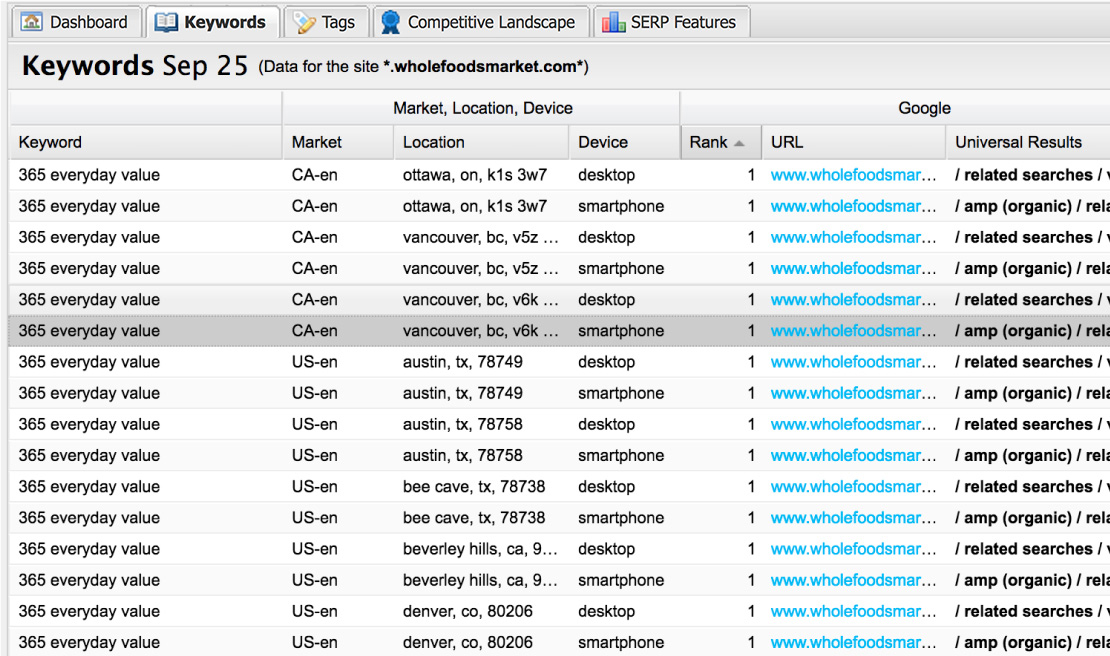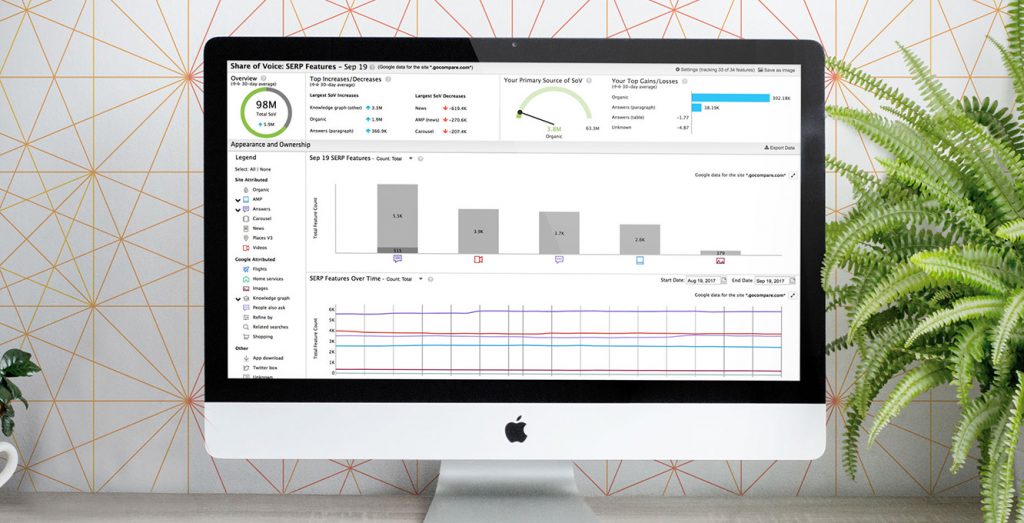Daily rank tracking & analytics
Surface new insights, every single day.
Arm yourself with precise, up-to-date ranking data and analytics, in any location, on desktop and mobile, for all your keywords, every day.
With instant insight, change comes easy. Switch tactics. Seize new opportunities. And chart your growth in real time.

Work with ranking data you trust
With accurate, reliable ranking data, you’ll know exactly how well you’re performing — for sites, single SERPs, pages, and more — and be confident in the steps you take next.

See fresh insights, daily
One data point per week simply can’t compete with seven. Daily tracking means you can spot even the slightest dips and spikes in your rankings as they happen.

Mine the full SERP for more inspiration
From SERP features to CPC and search volume, you’ll have everything the 100-result SERP has to offer, plus crucial keyword metrics. The more expansive your data, the more agile you’ll be.

Spot trends over time
Dig into a comprehensive archive of your historical SERP data — including snapshots of your actual SERPs — to uncover unique trends and seasonal fluctuations.

Get everything at scale
Track a thousand keywords. A million pages. Take on one site at a time. Or several all at once. It’s simple to calibrate STAT however you need, so you can make large-scale SEO look easy.
Full SERP archives
Dig deep into complete archives for seasonal and trend research.
More than rankings
Cost-per-click, search volume, Google SERP features, and more.
Smart segmentation
Custom keyword tagging for powerful big-data insights.


“We don’t focus on 50 keywords for each client, we focus on thousands of keywords.”
I can't imagine another tool that can process that amount of data so quickly and so accurately. It makes the client happier and us look better.
Kieran Bass
Strategy Director, Roast


“It’s fun to run up against the limits of Google.”
That’s something that I wouldn’t have been able to do without STAT. To put in keywords today and have data tomorrow has meant that we’ve been really flexible when we get an idea.
Jake Marcet
SEO Analyst, Cars.com


“STAT allows us to analyze keyword sets across hundreds of different categories in a way that just wasn’t possible before.”
Jesse Semchuck
Director of Online Marketing, Top Ten Reviews

Common Questions
about daily rank tracking
-
I only track 500 search terms. Why would I ever need 10,000 or a million keywords?
You’d be surprised! Once you start seeing the kinds of insights you can only get from large-scale rank tracking and SERP analytics, those numbers will make perfect sense.
Most of our clients track their keyword lists for multiple markets, search locations, and devices. With such comprehensive SERP tracking, even a modest list of 500 search terms can quickly multiply into many thousands of distinct search queries.
Want a glimpse of how our clients get a competitive advantage from tracking on this scale? Read our client snapshots. Want to chat about your specific situation? Feel free to talk to us.
-
Am I charged for duplicate keywords?
The short answer is yes, but at a much lower per-keyword rate.
The longer explanation is this. In STAT, the term “duplicate keyword” has a specific technical definition. If you were to track the same 100 search queries against 10 different websites, then we would count that as 100 unique keywords and 900 duplicate keywords. Those duplicate keywords each cost much less than a unique keyword.
On the other hand, if you were to track 100 search terms in 10 different markets, that is effectively 1000 distinct queries or unique keywords.
At high-volumes, the math can get complicated. But the basic idea is simple: we charge one rate for each unique keyword, and a much lower rate for each duplicate keyword.
It’s all broken down transparently in your account, so you can see exactly what you’re paying at any time.
-
Do I have to track all of my sites and keywords continuously? Or can I “pause” them?
No worries—STAT makes it simple to pause tracking on single keywords, single websites, or even entire projects.
This is handy for seasonal SEO efforts and for one-off research and experimentation. Digital marketing and SEO agencies find it especially useful for managing lots of client accounts as they switch back and forth between active and inactive.
You aren’t charged for paused keywords. All of your historical data for inactive keywords stays in STAT, so you can access and export it at any time.
-
Isn’t daily SERP tracking overkill? What about weekly or monthly?
The search landscape is very volatile, so daily tracking is what our clients need to respond quickly and stay on top of the competition.
For some types of reporting, daily data can be too granular. STAT makes it easy to report weekly or monthly averages for key metrics. Because these averages are based on actual daily SERP data rather than once-a-week or once-a-month snapshots, they offer an incredibly accurate representation of what’s happening in the SERPs.
-
How do I manage so much data? What exactly is “smart segmentation”?
When you’re doing SERP tracking on such a large scale, great management and segmentation is critical.
In STAT, you can tag your keywords with as many custom tags as you please. These are essentially custom segments that you can use to slice your keywords in any number of ways — for example, by product characteristic, by subject area, or by searcher intent.
There are also dynamic tags, which work like smart playlists. They are automatically populated with keywords based on simple, logical rules.
For example, you could create a dynamic tag that contains all of your keywords with search volume over a million. As search volume numbers are updated, the keywords within the dynamic tag will update as well.
You can base your reports and custom alerts on any tag or set of tags, which creates endless possibilities for mining new insights from your SERP data.
-
What about Google universal results like images, maps, and news? How do you keep up?
It’s our job to keep up! Our platform not only captures known types of Google universal results, it also alerts us the moment Google releases a new result type. So you can always rely on STAT’s reporting to keep pace with changes to how Google is building SERPs.
STAT collects all Google universal results and reports on relevant data like ranking, landing page URL, result title, result description, and so on.
Why are universal results so important? Very simply, because they compete for real estate with organic search results. If you’re only tracking organic results, you’re only getting half of the picture.
-
How can I use my historical SERP archive? How long does STAT retain that data?
In addition to using their historical data to benchmark their SEO progress over time, many of our clients use their SERP archives for seasonality and trend research. It can be a huge volume of invaluable data, so the possibilities are almost endless.
As a part of our standard service, we retain all of your keyword data for two years, and raw SERPs for 10 months. If you need longer, you can export your data via our API, or you can always talk to us about extending your data retention.
-
What if I need to track over 100,000 keywords? How does your pricing scale?
STAT is designed especially for enterprise-scale SERP tracking.
If your tracking needs are huge, don’t worry — we can handle it. Our clients include some of the world’s largest online brands, tracking thousands of domains and locations globally.
Our pricing model is different than what you might expect from conventional enterprise software. We want to encourage all of our clients to think bigger and track more widely than ever before, so our per-keyword rates are highly competitive.
In fact, if you plan on tracking more than 100,000 unique search queries, ask us about special pricing and our bulk API services.
(For deeper custom research, some of our larger clients choose to use our separate, specialty bulk API services for full Adwords ads, full parsed SERP archives, or raw HTML SERPs. These are billed extra by site, and are completely separate from our standard API.)
-
How can I get all of my data out of STAT?
In the STAT web app, it’s as simple as right-clicking on any table to export as a CSV spreadsheet. You can also create scheduled reports so that all of your key data is exported to spreadsheets regularly.
For higher-volume exporting, we have the API. That also allows you to integrate STAT’s metrics into your own internal data warehousing.





